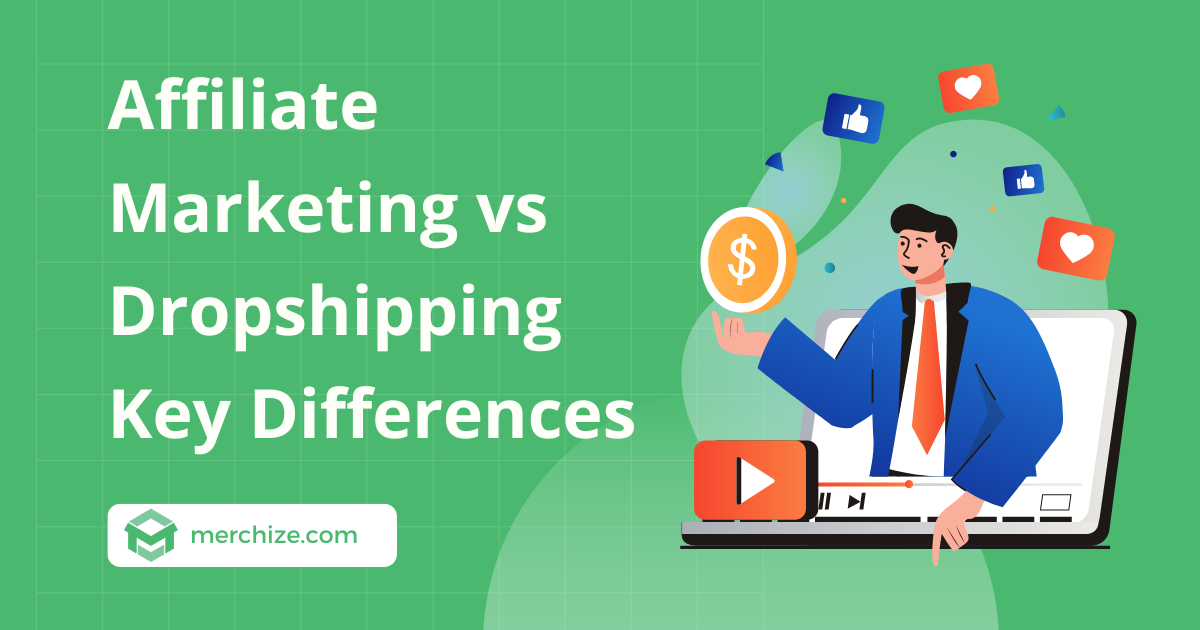Contents
Are you looking for a flexible way to earn money online, without the hassle of managing inventory or customer support? Or maybe you’re ready to dive into building your own online store and create a brand from scratch? Affiliate marketing and dropshipping are two powerful models in the world of e-commerce, offering unique advantages depending on your business goals. Whether you’re aiming to generate passive income or start your own online shop, understanding how each strategy works is key to making the right choice. Ready to find out which one suits you best? Let’s get started!
What is affiliate marketing?
Have you ever clicked a link in a blog or YouTube video that led you to an online store? There’s a good chance that was an affiliate link. When you purchase through that link, the creator gets a cut.
Affiliate marketing is a performance-based marketing strategy where businesses reward individuals outside their organization for promoting and driving sales to their stores with their marketing efforts.
You can earn a commission for every successful sale, click, or lead generated through a given unique referral link. In other words, the more people click and buy products through your referral link, the more money you earn.
Affiliate marketing has become very common in the world of e-commerce. From the business side, it’s a low-risk way to expand reach. They only pay for results. For people who are doing affiliate marketing, it’s an opportunity to earn passive income by promoting products or services through recommendation.
What is dropshipping?
Dropshipping is a business model that allows you to run an online store and sell products without owning stock. How is that possible? Dropshippers will work with a third-party supplier who will ship products directly to your customers when customers buy from your store.
In dropshipping, you can sell products to customers without ever holding the inventory yourself. You just have to focus on marketing and sales; your supplier handles the heavy lifting.
No upfront investment. No inventory management. No fear of unsold stock. These undeniable benefits help to remove some of the biggest barriers for entrepreneurs when they first enter the e-commerce market.
Yet, it’s not all smooth sailing. Shipping times can be unpredictable, and your profit margins might not be sky-high. But for many, the allure of starting a business with minimal investment and the freedom to work from anywhere far outweighs those challenges.
Affiliate marketing vs Dropshipping
Now that you have a grasp of what affiliate marketing and dropshipping are, let’s dive deeper into the operation of each model and how they are different from each other.
Inventory Management
Both affiliate marketing and dropshipping don’t involve inventory management. However, there is a slight difference in how each model deals with inventory:
- Affiliate Marketing: No inventory needed. You’re just referring customers to another business. Since you don’t sell products, there is no responsibility on your side in case of any issue with the inventory or shipping.
- Dropshipping: No need for physical inventory, but you manage the storefront and handle orders. Even though you don’t directly own or control the inventory, since the business is yours, you will take full responsibility in front of your customers if there is any problem with the inventory. Late deliveries or running out of stock might result in customer complaints and affect your business’s image.
Revenue Source
One of the core differences between dropshipping and affiliate marketing is the revenue source – or where the money comes from.
- Affiliate Marketing: You earn a percentage of the sale as a commission, usually at a set rate (e.g., 5% to 30% of the sale value). Most of the time, the commission rate is set and can’t be changed for your reference.
- Dropshipping: You profit from the difference between the supplier’s price and the price you set for the customer. Unlike affiliate marketing, dropshippers have full control over the profit margin.
Control Over Pricing
Do you enjoy playing with numbers, or would you rather let someone else handle that? Your answer to this question will give you important clues about which one, affiliate marketing or dropshipping, is better for you.
- Affiliate Marketing: Affiliate marketing gives you no say in the pricing—you’re working with whatever the retailer decides.
- Dropshipping: You control the pricing of products and decide how much to charge customers. This gives you flexibility but also requires more attention to market trends and competitive pricing.
Managing pricing is a tough challenge that requires a lot of consideration. The decision to lower or increase the pricing will significantly affect your business’s bottom line. But with affiliate marketing, you are totally free from these considerations. What you need to focus on is never about setting the right price, but how to convert visitors into customers.
Customer Ownership
One key difference between these two business models is who owns the customer relationship.
- Affiliate Marketing: Once someone clicks your link and buys, they’re no longer your customer. The retailer takes over from there. However, since the customers buy the products through your recommendation if that product doesn’t meet their expectations or align with your reviews, it can cause the customers to distrust you and your personal brand.
- Dropshipping: Dropshipping allows you to maintain full control of the customer experience. It’s your store, your brand, and your customer service.
In this regard, to choose a suitable business, you should think about whether you want to build a lasting relationship with your buyers, or if you are comfortable passing them off once the sale is made.
Profits
Potential for profits, for some, is the compass that helps them decide whether or not to enter a market.
- Affiliate Marketing: Lower profit margins since you only earn a commission on sales.
- Dropshipping: Potentially higher margins as you have full control over the pricing. You can earn adjust the margins higher, as long as you manage to keep the cost low and price competitive.
If you expect a high-return type of business, dropshipping will be the answer for you. On the other hand, if you have no high expectations about the profits and probably want a more safe and low-maintenance side hustle to earn extra income, then choose affiliate marketing.
Cost
When it comes to cost, affiliate marketing and dropshipping take very different roads. Both are relatively low-cost compared to traditional businesses, but let’s unpack the differences.
- Affiliate marketing: Affiliate marketing requires less cost. All you really need is a platform—whether it’s a blog, a YouTube channel, or social media—to promote products. Creating content is the backbone of affiliate marketing. Other than that, there is no need to rent space or stock up on supplies. Your biggest expenses? Maybe a domain name or a bit of marketing. You could start with nothing more than a laptop and an internet connection.
- Dropshipping: Dropshipping, while still low-cost, requires more upfront investment. Think of it as setting up a virtual storefront. You’ll need to pay for hosting, website design, and possibly some marketing tools. While you don’t have to buy inventory, you still need to run your store, which means you might want to invest in tools to manage orders, customer inquiries, and suppliers. This setup isn’t free, but it’s far less expensive than stocking shelves full of products.
But here’s where the plot thickens: with dropshipping, the more you grow, the more costs sneak up on you. Paid ads, customer service tools, and site maintenance can add up quickly. And if you don’t keep an eye on those expenses, they can bite into your profits before you even notice.
So, the question is: how much are you willing to invest? Are you more comfortable keeping things lean and simple with affiliate marketing? Or are you open to spending a little more for the potential of higher profits and building your own brand with dropshipping?
Skills
In order to succeed in any type of business, certain skills are required. To know if affiliate marketing or dropshipping is a fit for you, let’s see if you have the skills required to thrive in each business:
Setup & Maintenance:
In terms of set-up and maintenance, affiliate marketing and dropshipping are quite distinctive from each other. Understanding how each model is set up and maintained will help you decide what option is more aligned with your skill set and expertise.
- Affiliate Marketing: Affiliate marketing has an easy setup. You don’t need a storefront—just a platform to promote products, whether it’s a blog, social media page, or YouTube channel.
- Dropshipping: Dropshipping, though, requires more upfront work. You need to set up an online store, find suppliers, and manage orders. It’s like choosing between setting up a pop-up shop versus running a full-blown retail store. Which sounds more appealing to you.
If you have already owned a platform and following, it is much easier to start out affiliate marketing business. On the other hand, if you are more familiar with running e-commerce or digital marketing, then dropshipping is right up your alley.
Risk
One’s risk tolerance is also a key factor that helps determine what business is a better suit.
- Affiliate Marketing: Low risk since you’re only promoting products. You don’t deal with returns, customer service, or product quality issues. Your responsibility ends once they click that link. There’s no risk of handling a lost shipment or dealing with a customer who ordered the wrong size. It’s low-risk because, ultimately, you’re just the middleman, free from the headaches of post-purchase chaos.
- Dropshipping: More risk because you’re responsible for customer satisfaction, shipping, returns, and any problems with suppliers. In dropshipping, you decide what products to sell, set the prices, and build a brand. But with greater control comes greater risk. Sure, you’re not storing boxes of inventory in your garage, but you are responsible for everything else—shipping mishaps, returns, delayed suppliers. Ever had to explain to someone why their package is three weeks late? It’s no picnic.
You also need to think about customer satisfaction. With dropshipping, the buck stops with you. If the product is poor quality or the supplier fails to deliver, you’re the one handling the complaints, not the supplier.
Customer Support
Affiliate marketing and dropshipping take a whole different approach when it comes to customer support.
- Affiliate Marketing: You don’t handle any customer service or post-purchase issues.
- Dropshipping: You are responsible for customer support, addressing complaints, and processing returns or refunds.
Customer support is an important part of e-commerce business. However, this part of the business is not easy to digest, not to say a tough pill to swallow. Whether you are willing to take this important responsibility or not is important in determining which option is right for you.
Branding
Building a brand is important for both affiliate marketing and dropshipping. However, the brand each model focuses on are entirely different.
- Affiliate Marketing: Affiliate marketing has more to do with personal branding rather than business branding. You can still do branding anonymously online. However, with the help of a reliable personal brand, you can easily boost the effect of your affiliate marketing effort.
- Dropshipping: Dropshipping gives you the chance to create a unique brand for your own business, design your store’s experience, and market it as your own. If you’re looking to build a long-term business with your own stamp on it, dropshipping might be more your style.
Scalability
Scalability is important in the long run. Which model is easier to scale and grow? Before choosing between affiliate marketing and dropshipping, let’s just make sure you know what to expect with each option.
- Affiliate marketing: Traffic is the key to scalability in affiliate marketing. As your traffic increases, so do your earnings—without any need to scale up operations. With affiliate marketing, you don’t have to worry about orders, shipping, or customer service – all the major obstacles to growth in regular business. That means you have all the room to grow exponentially.
- Dropshipping: Scalability is more dynamic and complicated—but also more demanding. Sure, you don’t need to worry about fulfilling orders manually or stocking inventory, but as your business grows, so does the complexity. More sales mean more customer service issues to resolve, more orders to track, and more marketing efforts to manage. You’ll need to invest in tools to automate processes, hire help, and potentially partner with more suppliers.
Sum Up
| Criteria | Affiliate Marketing | Dropshipping |
| Inventory Management | No inventory or shipping responsibilities. | No inventory is needed, but responsible for storefront management and customer issues like delays or stockouts. |
| Revenue Source | Commission-based, earning a set percentage of sales (5%-30%). | Profit from the margin between supplier’s price and your selling price, giving full control over profit margins. |
| Control Over Pricing | No control over pricing, set by the retailer. | Full control over product pricing requires constant market analysis and competitive pricing. |
| Customer Ownership | No customer ownership; the retailer manages post-purchase customer relationships. | Full customer ownership; you handle customer service and experience, building long-term relationships. |
| Profit Potential | Lower profits due to set commission rates. | Higher profit potential, as you control pricing and margins. |
| Cost | Minimal costs, mainly platform and content creation (e.g., domain, marketing). | Higher upfront costs, such as hosting, store setup, and tools for order and customer management. |
| Skills Needed | Easier setup with fewer technical skills required. Promoting via existing platforms (e.g., blogs, social media). | More demanding setup, including creating an online store, managing suppliers, and handling customer service. |
| Risk | Low risk, no direct customer issues, shipping, or returns. | Higher risk, with responsibility for customer satisfaction, shipping, returns, and supplier problems. |
| Customer Support | No customer support duties. | Full responsibility for customer support, returns, and refunds. |
| Branding | Personal branding is more critical than business branding. | Opportunity to create a unique brand and business identity. |
| Scalability | Easy to scale with increased traffic and no need for operational expansion. | Scaling leads to more operational complexity, requiring tools and possibly additional help for customer support. |
What should you choose: Affiliate marketing or Dropshipping?
Based on the detailed comparison between affiliate marketing and dropshipping, here is the short summary that help you decide which option is right for you:
Who Should Choose Affiliate Marketing:
- Ideal for those who prefer a low-risk, low-maintenance side hustle.
- Suitable for individuals with existing platforms (blogs, YouTube channels, social media) who can promote products.
- Great for people who don’t want to handle inventory, customer service, or deal with post-purchase issues.
- Best for those comfortable earning a set commission and not controlling product pricing.
- Fits those who want to focus on content creation and traffic generation without the complexities of running an online store.
Who Should Choose Dropshipping:
- Perfect for entrepreneurs who want full control over their business, including pricing and branding.
- Ideal for those looking for higher profit potential and willing to invest more time and money upfront.
- Suitable for individuals comfortable managing customer support, shipping, and supplier relationships.
- Best for those who enjoy analyzing market trends, managing a storefront, and optimizing product offerings.
- Fits people interested in building a long-term business with their own brand identity and a direct customer relationship.
Both affiliate marketing and dropshipping offer unique opportunities depending on your goals, skills, and risk tolerance. Whether you’re looking for a simple, low-cost way to earn commissions or want full control of a branded online store, the choice is yours. Take time to reflect on what suits you best, then dive in and start building your online income. Now’s the time to take action—choose your path and begin your journey!





